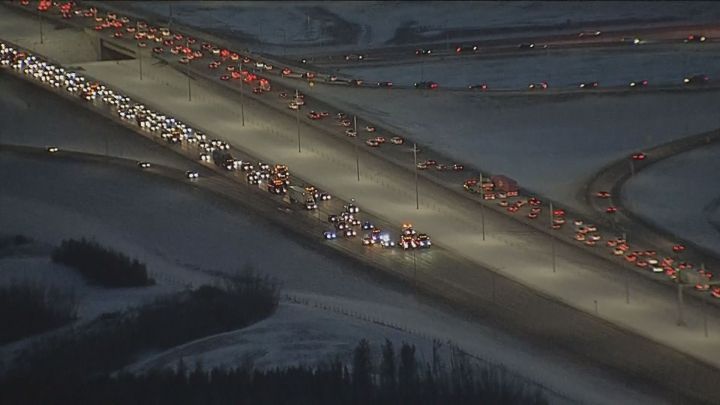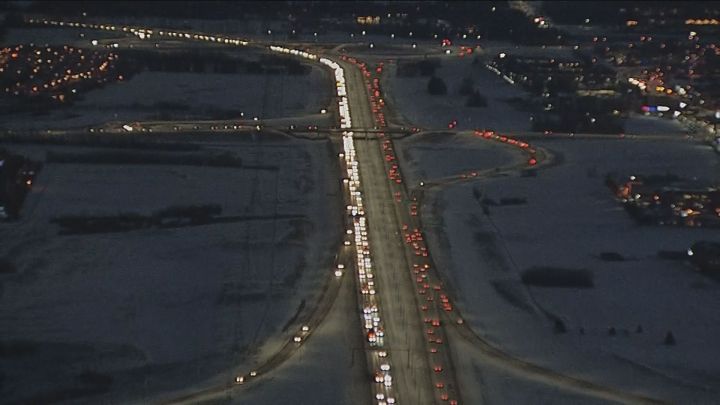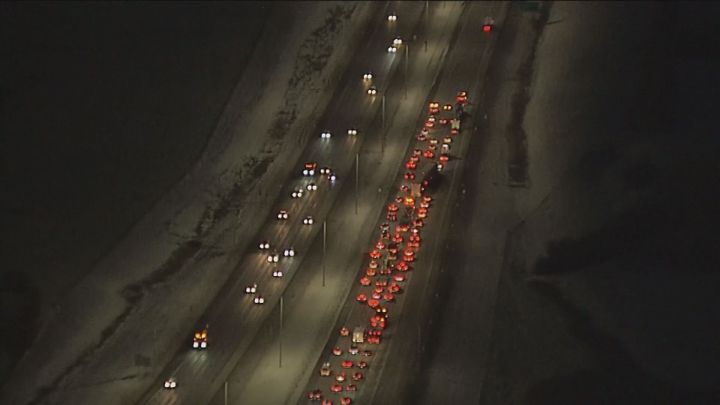Wednesday’s afternoon rush hour in Edmonton slowed down to a crawl in parts of the city’s south side and outside city limits in the wake of a massive pro-pipeline convoy that got underway hours earlier.

The official plan for the pro-pipeline event contained it to the Nisku industrial area, but in the afternoon some of the estimated 1,200 truckers who attended continued their protest by heading up the QEII, sometimes six abreast, and onto the south leg of Edmonton’s ring road.
The backlog moved onto Anthony Henday Drive, both east and westbound, travelling at a snail’s pace. The vehicles were blocking all lanes of the freeway, as well as the shoulders of the road. Nobody could get by.
READ MORE: Nisku truck convoy and pro-pipeline rally ‘way bigger than expected’: organizer
Shortly after 5 p.m., trucks in the west lanes of northbound Anthony Henday Drive, were moving slowly just north of Stony Plain Road.
Global Edmonton traffic reporter Lauren Fink said the convoy caused “huge backups.” The same situation was unfolding on the east leg of the Henday, northbound, which was backed up from about Highway 14 to Highway 2.
Another convoy was headed south and approaching Highway 19, which backed up traffic from just south of 41 Avenue S.W. to the Henday.
“If you are travelling through these areas, you are going to need to expect major delays,” Fink said.
WATCH BELOW: During Edmonton’s evening rush hour, vehicles across every lane of Henday West near Stony Plain Road were driving extremely slow, backing up traffic. Vinesh Pratap has more on the move.

Police told Global News they did not try to deploy officers to the area to avoid further congestion, however, police were trying to direct one of the convoys off the Henday and onto Highway 14.
Traffic volumes cleared up around 6 p.m. as the convoys disbanded. The commuter chaos in Edmonton came on the heels of an event that saw a huge turnout south of the city.

Get breaking National news
A 22-kilometre-long truck convoy got underway at 11:30 a.m. and made its way through the Nisku industrial area, where many oil and gas companies have been affected by the low price of Alberta crude. The convoy was organized to draw attention to the province’s struggling energy sector.
View photos of Wednesday afternoon’s traffic jams in the gallery below:
While the cause of the later traffic backups was not officially confirmed, a driver who said he took part in the protest convoy earlier in the afternoon told Global News he believes they were purposely caused by pro-pipeline drivers.
“I don’t think there was any real formal… instigation of it,” Kyle Lyson said Wednesday night. “I spoke with a few people that… they had information that other people didn’t, saying that, ‘OK, this is what’s going on. We’re going to start going this way,’ and that’s it.
“Ottawa has to take notice of this because in a matter of hours they were able to cripple a city’s infrastructure… There was a complete standstill on the Anthony Henday… and you couldn’t get through.”
Some Edmontonians took to social media to say the drivers involved in the convoy were making them late for appointments.
“How’s contesting the traffic on the Henday in Edmonton supposed to help get the pipeline built?” read one tweet from someone with the Twitter handle @pube_780.
“We’re all in the same boat, so pissing off your neighbours doesn’t do anything for the cause.”
“We’re for the pipeline but we have hit this traffic mess north and south today and it’s very frustrating,” read another Tweet from someone using the Twitter handle @HickeyCarol.
“Appointments were missed and upsetting a lot of people for the pipeline. All for protesting but do it in front of Justin Trudeau not in front of the people supporting it.”
Lyson told Global News that he understands some people weren’t happy with Wednesday’s actions.
“I fully understand where they’re coming from, but everybody’s been angry since the original (oil industry) downturn started in 2014,” he said. “It’s been messing with people. I fully get that they’re angry, but so is everyone else.
“It’s doing what it was meant to do, to get people talking and to get people’s emotions on the go.”
Lyson said he wouldn’t say if causing the traffic tieups was right or wrong. He told Global News he spent “five years with fire and rescue” and know that traffic jams can present risks.
“That would make a huge difference in response times, but you know, luckily there’s good communication throughout the city to try and get people moving where they had to in case of emergency, so there’s the bad of it,” he said.
“But the good of it is it got everyone speaking — people have heard about it from west to east.”
— With files from Karen Bartko, Global News













Comments